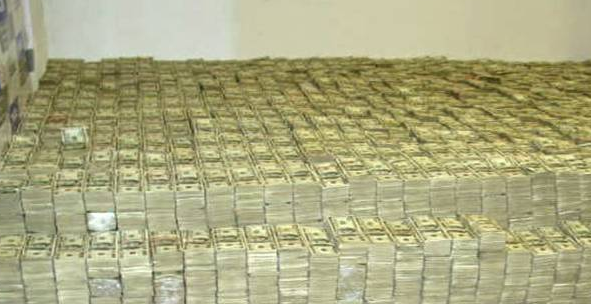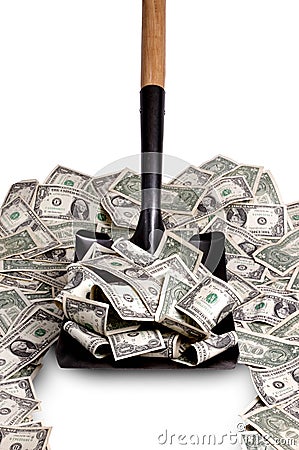OK, get out your virtual pen and check off the items that are complete:
___ Excel
___ Bank account for personal escrow funds
___ Summary of fixed, variable, and non-monthly expenses
If you don't have checkmarks in all 3 slots, this articles won't be much help. Head back to Part I of Big B's Budget Blog for your homework assignment right here.
Now for the big question, how did the budget turn out? Mine had a few surprises (like negative cashflow). Assembled below are some of the best tricks I've come up with since living on a budget. Nope, none of the concepts were stolen from Dave Ramsey, Wikipedia, or mint.com. They all came from the school of hard knocks.
.jpg) |
| You need a suitcase full of these to buy anything. |
Fun Money
This is the toughest budgetary item for most folks out there. First, decide how much money to spend on the frivolous, unnecessary items. For people making tons of money, you're probably OK putting all the money in one line item and discussing the items as you go. If fun money is a very low amount, or you can never agree on how to spend the money, give everyone in the family an allocation of cash. My budget had this issue early on. We had a puny $100 to dump in this bucket. Well, it was really more like a thimble. The spreadsheet had 2 line items:
Me $50
Her $50
 |
| Her |
The money could be used for eating out, computer games, or setting a fire in the back yard with $1 bills. If we went out to eat, she could have the $35 lobster tails with a glass of wine. I could suffer through the $6 meatloaf, but pick up a copy of Diablo II at Best Buy on the way home. You get the drift. As an added bonus, the leftover fun money carried into next month's budget! That way, we could eventually buy stuff that cost more than $50. Small loans into next month were also permitted for special occasions.
 |
| Me |
Windfalls
In the pre-budget days, my first windfall was about $1,000. WOW!! My first thought was that we had plenty of money to do anything in the world. Fun stuff got slapped on the credit card like mad until the statement came in. A quick calculation showed that the windfall was spent approximately 2.5 times. I don't remember pondering this one over a bourbon, but it was probably the case. After the "windfall disaster", a new worksheet appeared in Excel named "Bonus Money". The after tax amount is listed at the top, line items summarized, and the remainder is computed right under the amount. We take great care these days in planning bonus money, and doing it is fun to boot. All of the money is either spent on things that are agreed on or put into an interest bearing account. How do we pick things to spend the money on? Check out the "Long Term Projects" tab. Yes, future house blog articles are listed in priority order here with an approximate cost.
Scratching your head and wondering how you get windfalls? Here are a few ideas:
- If you get paid biweekly, only budget 2 paychecks each month. That way, 2 paychecks each year are windfalls! (well, technically you get 3 every 7-8 years)
- Set federal and state withholdings, so you get a tax return instead of paying. Don't go crazy, Uncle Sam doesn't pay interest.
- Get a credit card that pays cash back, like my Chase Rewards Visa. Withdraw the money for a windfall when the money builds up.
- CHRISTMAS MONEY!!!
Up until recently, my company had a Cadillac health insurance policy that included $10 doctor visits, $15 prescriptions, and no deductable. My first son was born to the tune of $100. Seriously. Fast forward to corporate cost cutting ideas and high deductable health care plans. Family plans with a $3,000 deductables are common now. That's tough on a monthly budget, but Uncle Sam has a program to assist with some of the cost. If you have an HSA plan at work, an account can be opened to pay for medical bills. Any money deposited into the HSA savings account is pre-tax, so the money doesn't make it to the Taxable Earnings column of your paycheck. We deposit enough money in this account to pay for 100% of medical costs. Doctor bills and prescriptions are entered in this tab and paid with the Chase Visa card (earning us a 1% rebate), and money is moved out of the HSA account to cover the bills.
Short Term Savings
Lots of the expensive stuff in your house has a tendancy to break over the long haul like hot water heaters, A/C coils, microwaves, and TV sets. Cars have the same problem. Most monthly budgets can't handle a $2,000 repair bill, even if you eat refried beans all month. While we still had 2 incomes, my wife shoveled money into an account to pay for expensive, incidental items. Ours is set up in a brokerage account that is invested in bonds and a money market cash fund. Unless you have a bigger pile of money than the picture, stick to funds that are easily liquified. Sure, Verizon stock pays a great dividend, but what if you need $4,000 to pay for a new roof when the Dow is down 1,000 points? If you don't have a rainy day fund, start one now. Either take a windfall and sock it away or allocate money each month to build one up.
Donations
Last but not least, the donations tab keeps track of money that we donate to charity. We give money to several causes throughout the year, and I print this tab before going to the tax guy.
Parting Thoughts
Big B's budget has evolved over nearly 20 years, and it works for our household like a charm. Feel free to take any of the ideas in the article and add new ones that pertain to your own personal life. Managing your money with a budget over time can greatly reduce the stress in personal finances. What if the greatest stress in your budget was how to spend a windfall? That's my dream.
Interested in tips to lower your electricity bill? Click here



En resumen, La Casa de los Famosos en Colombia es mucho más que un simple reality show: es un espacio de entretenimiento, diversión y drama que refleja de manera cruda y directa la experiencia de ser famoso en un mundo mediático y exigente.
ReplyDeletehttps://terasacucartiro.one/
https://terasacucartiro.one/
Delete